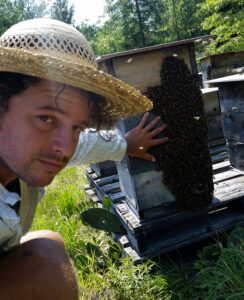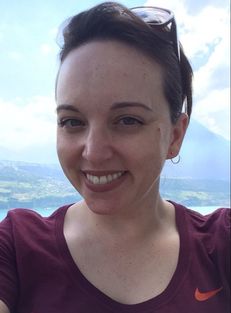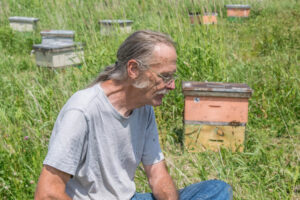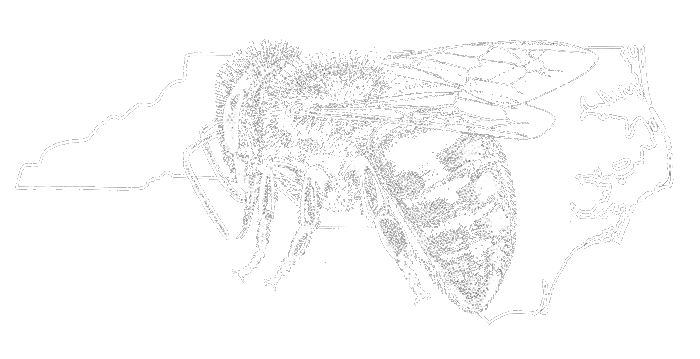Dear Members of NCSBA,
I hope this message finds you in good health and we hope for the continued well being of yourself, family/loved ones, & friends. The Covid-19 era has hit us all hard & we are all looking forward to when we can all gather in fellowship with other beekeepers once again. We understand that many may be discouraged or frustrated that we weren’t able to host our usual summer conference and also have had to likewise cancel our regularly scheduled Spring conference this year in New Bern. We want you to know we share your frustrations but that we have put the wellbeing of all our members health concerns first. Much of our membership is an older/most at risk demographic and we could not in good faith or legally hold a large group conference like we normally do. Even though we haven’t been having conferences your executive committee& board of directors have been meeting to find ways to move our group forward for you our members. It is in this spirit that we have decided to give back to our membership, for the good of the hive! We will be hosting a weekly web-series beginning in mid-March, hosting notable speakers from the honeybee world to present to our NCSBA membership at the steep price of on-the-house. We hope that you will join us and take advantage of the great speakers we have lined up for you. You will find below the dates, speakers, topics, and short bio on the speakers. We are hopeful that by summer there may be a possibility of an in-person conference but it is too early to say for certainty. Be on the look out for more information on how to access the presentations from 1st VP Frederick Proni and message from the President Doug Vinson regarding any other details for NCSBA, conferences, & NCSBA programs for 2021.
Sincerely, Burton Beasley
2nd VP of NCSBA
Upcoming Webinars
(Access information will be provided closer to the event date)
March 18th, 2021: 7pm-9pm ET
Sam Comfort: Anarchy Apiaries
Topic: The Good, the Bad, and the Bugly: recent efforts to simplify a complex bee world
 After winning 6 hives in a poker game, Sam Comfort worked for several years in commercial beekeeping across America. He started Anarchy Apiaries in 2005 to explore permaculture ideas of low input natural cycles. He breeds queen from hardy survivors, experiments with splitting techniques, and messes around with hive designs. So the mission is to 1) make more beehives than there are televisions, and 2) have a good time, all the time (with bees). Anarchy Apiaries runs around 1000 hives that split seasonally into around 2000 mating nucs with no treatments, minimal feeding, and do-it-yourself hive boxes in New York and Florida and spots in between. Through teaching independent, biological beekeeping, he hopes to make it more affordable, approachable, and enjoyable; thus, bring the means of production back to the beekeeper.
After winning 6 hives in a poker game, Sam Comfort worked for several years in commercial beekeeping across America. He started Anarchy Apiaries in 2005 to explore permaculture ideas of low input natural cycles. He breeds queen from hardy survivors, experiments with splitting techniques, and messes around with hive designs. So the mission is to 1) make more beehives than there are televisions, and 2) have a good time, all the time (with bees). Anarchy Apiaries runs around 1000 hives that split seasonally into around 2000 mating nucs with no treatments, minimal feeding, and do-it-yourself hive boxes in New York and Florida and spots in between. Through teaching independent, biological beekeeping, he hopes to make it more affordable, approachable, and enjoyable; thus, bring the means of production back to the beekeeper.
@anarchyapiaries
www.anarchyapiaries.org
March 25th, 2021: 5:30-7:15pm ET
Dr. Margaret J. Couvillon, Assistant Prof. of Pollinator Biology & Ecology
Department of Entomology, Virginia Tech
Topic: Dancing bees bio-indicate landscape profitability for pollinators
 Dr. Margaret J. Couvillon is a broadly trained bee researcher with a particular interest in the foraging and recruitment behaviors of the honey bee. I earned my undergraduate degree from Loyola University in New Orleans (B.S. in Biology, minor in Chemistry) and then spent a year as an AmeriCorps *NCCC volunteer. I completed a M.S. in Neurobiology at Duke University before moving overseas for my Ph.D. with Professor Francis Ratnieks at the University of Sheffield, where I investigated mechanisms of nestmate recognition in honey bees and stingless bees. As a postdoctoral researcher with Professor Anna Dornhaus at the University of Arizona, I investigated proximate and ultimate explanations for worker size variation in the bumble bee Bombus impatiens. For a second postdoc, I rejoined the lab of Francis Ratnieks, now at the University of Sussex in Brighton, England. There I worked to develop the honey bee, in particular its waggle dance communication, as a bioindicator for the “health” of the British landscape.
Dr. Margaret J. Couvillon is a broadly trained bee researcher with a particular interest in the foraging and recruitment behaviors of the honey bee. I earned my undergraduate degree from Loyola University in New Orleans (B.S. in Biology, minor in Chemistry) and then spent a year as an AmeriCorps *NCCC volunteer. I completed a M.S. in Neurobiology at Duke University before moving overseas for my Ph.D. with Professor Francis Ratnieks at the University of Sheffield, where I investigated mechanisms of nestmate recognition in honey bees and stingless bees. As a postdoctoral researcher with Professor Anna Dornhaus at the University of Arizona, I investigated proximate and ultimate explanations for worker size variation in the bumble bee Bombus impatiens. For a second postdoc, I rejoined the lab of Francis Ratnieks, now at the University of Sussex in Brighton, England. There I worked to develop the honey bee, in particular its waggle dance communication, as a bioindicator for the “health” of the British landscape.
April 1st, 2021 7:00-9:00pm ET
Mike Palmer: French Hill Apiairies
Topic: A Year at French Hill Apiaries – An overview of the management that goes into a commercial apiary
 Mike Palmer bought his first two packages of bees from FW Jones Company of Quebec in 1974. They cost $10.50 delivered. Neither colony made it through the first winter, but he kept trying and built up to 200 hives by 1981.
Mike Palmer bought his first two packages of bees from FW Jones Company of Quebec in 1974. They cost $10.50 delivered. Neither colony made it through the first winter, but he kept trying and built up to 200 hives by 1981.
In 1982, Mike got a job managing the bees owned by Chazy Orchards in Chazy, New York and did so until 1986. Then he convinced Chazy to sell their bees to him, so at that time, he had more than 600 colonies.
Mike began raising his own queens in 1998 and has been doing so ever since. Today, Mike raises about 1200 queens and manages over 1000 colonies, with some 600-700 production colonies, and hundreds of nucleus colonies.
He has lectured on his methods of beekeeping all over the world
**April 8th, 2021: We are currently working on the possibility of hosting a 4th speaker**
